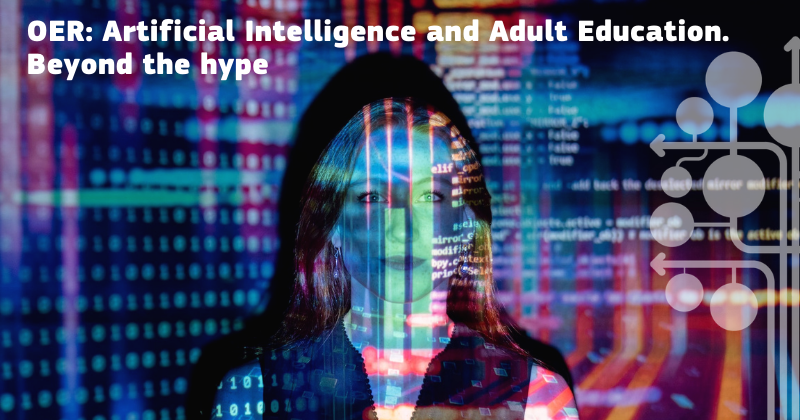OER: Artificial Intelligence and Adult Education. Beyond the hype

Table of contents
- Introduction
- Learning with AI
- Learning about AI
- Preparing for AI
- Beyond the Hype
- All a bit negative?
- Questions for discussion
- Licences and Attribution
- CC LICENSED CONTENT, ORIGINAL
- CC LICENSED CONTENT, SHARED PREVIOUSLY
- ALL RIGHTS RESERVED CONTENT
- The Author
Introduction
When you hear the words “Artificial Intelligence”, what is the first thing that pops into your mind?
For many, it conjures up images of a dystopian future ruled by emotionless humanoid machines. However, the reality is that Artificial Intelligence (AI) is already among us. Although we might not notice it, increasingly every day we all engage with AI in almost every aspect of our daily lives: whether we are using our mobile phones, reading an article in a newspaper, buying something online, checking the weather forecast, playing a computer game, being injected with a vaccine – the list is endless. AI is also increasingly becoming embedded in education and, in particular, it will soon be impacting on Adult Education.
It is easy to find many enthusiasts (including many well-funded corporations) who will tell you all about how AI will revolutionise education, and a few who will tell you how it will radically enhance Adult Education. I agree that there are some extraordinary possibilities but, as a learning scientist who has been exploring AI and education for almost a decade, I see my role as bringing a critical studies perspective – thinking about the very many challenges and trying to get behind the hyperbole. And that’s what I aim to do in this article.
To begin with, the connections between AI and education are more complex than many acknowledge – and there are a lot of misunderstandings out there, and little robust research (Miao and Holmes, 2021). In particular, I’m not aware of any research into the connection between AI and Adult Education – even though it is very likely that AI will be affecting Adult Education very soon. So, to help navigate the complexity, I find it useful to think of AI and education in terms of three “buckets”. My first bucket is “learning with AI”; the second is “learning about AI”; while the third is “preparing for AI”. In reality, like any categorisation, these buckets overlap in many ways, but I still find them a helpful starting point.
Artificial Intelligence and its possible role in adult education. An interview with Dr Wayne Holmes.
You can download the transcript of the video here.
Learning with AI
“Learning with AI”, using AI tools to support teaching and learning, may be further categorised as: system-supporting, student-supporting, and educator-supporting.
System-supporting AI includes AI tools designed to help with student recruitment, timetabling, finances, and all the other unglamorous back-end administrative tasks that educational institutions (schools, universities and Adult Education institutions) all need to do. There are also a few more innovative applications, such as HeadAI from Finland, which uses AI to identify trends in competencies required by businesses, so that universities and Adult Education institutions know which courses they ought to consider offering.
Student-supporting AI, on the other hand, is where most of the excitement and money is. This has been researched for more than forty years and has now “escaped” from the lab to be offered by large numbers of million dollar-funded corporations around the world. There are many types of student-supporting AI, the most prominent being the so-called intelligent tutoring systems (ITS). With these, the student engages with an online system that delivers some information, an activity and possibly a quiz. The student’s individual responses (where they click and what they answer) then determines the next piece of information, activity and quiz they are given. In this way, each student follows their own adapted pathway through the material to be learned. An example, one of the few ITS that is free to use, is Assistments, a maths programme. Other student-supporting AI includes dialogue-based tutoring systems (which use a dialogic Socratic-approach to teaching and learning – an Adult Education example is AutoTutor), automatic writing evaluation (examples of which, such as e-Rater, are increasingly being used in standardised assessments, especially in the USA), and chatbots (which use natural language processing to provide on-demand responses to student queries – here is a video example of one in use called Ada).
So how might student-supporting AI tools contribute specifically to Adult Education? In fact, to date, almost all these tools currently focus on providing support for students of school-age, in subjects such as mathematics, or other non-interpretative subjects like physics or computer science. There are very few that focus specifically on adult education, whether formal, informal or non formal. There are some language learning apps for non-formal learning (such as Duolingo), and a few that aim to improve writing (such as Ecree), while a very few are designed for workplace learning of job-specific competencies (such as Area9).
However, I’m not aware of any AI tools that address the practical vocational subjects, or any that support problem-based or collaborative learning. Nonetheless, for adult learners studying fundamental skills in literacy and mathematics, or for those who need the job-specific competencies on offer, the tools mentioned earlier could be advantageous. In theory, for those adult learners who must fit their learning into odd times during their day, between their work or caring commitments, or those involved in non-formal or informal learning, a virtual AI-powered tutor (perhaps on their phone) could be genuinely helpful – although, apart from those mentioned earlier, few such tools are currently available. However, I still question the use of the existing so-called intelligent tutoring systems in formal settings. I find it very odd that students in what are by design social learning spaces are expected to use AI systems that require them to interact almost exclusively with their individual computer screens, inevitably ignoring peers sat next to them and their educators.
In short, currently there are very few student-supporting AI tools developed specifically for adult learners, whether for formal, informal or non-formal learning, apart from perhaps the many available language learning apps, and even less research.
Educator-supporting AI But then what about the third type of “learning with AI”, educator-supporting AI, AI tools that do not replace educator functions but aim to help educators directly? The reality is, I’m only aware of one type of educator-supporting AI, automatic resource-curation, which is AI that scans the Internet in response to an educator’s query to identify quality resources that they can use in their teaching – and the ones that I do know (such as X5GON) still have a way to go before they are really useful. Nonetheless, tools like X5GON do have the potential to help adult learners engaged in non-formal or informal learning, who want to find resources that match their specific learning interests.

photo: Michael Dziedzic, Unsplash
Learning about AI
My second bucket, “learning about AI”, is all about learning how AI works, the techniques, and technologies, and how to create it. For years, universities across Europe and beyond have offered degrees in a range of AI subjects (including topics such as data analytics, machine learning, neural networks, and so on), enabling many graduates to take up extremely well-paid jobs as data scientists or AI engineers. But what about schools and Adult Learning? In recent months, UNESCO has been mapping AI school curricula from around the world, which has revealed that the teaching of AI in schools remains relatively uncommon (this work is due to be published in December 2021).
However, again, there is little that has been designed specifically for Adult Education institutions. It is possible to access an enormous variety of AI courses and tutorials via the Internet that any adult might choose to take, most often for free. One that is extremely popular, that introduces the technologies of AI and is available to all learners, is Elements of AI, from the University of Helsinki. Another one, from France, is ClassCode, which directs the user to question, experiment and understand what AI is.
Preparing for AI
By my third bucket, “preparing for AI”, I mean preparing all citizens for the impact of AI on all our lives. This includes helping everyone deal with issues such as AI hype, AI biases, fake news, and the impact on privacy and on jobs. While these issues are gaining increasing attention in academia (for example, it has been recognised that claims made about AI during the COVID pandemic were not actually realised) and the media (sometimes thanks to scandals such as those involving the Big Tech global corporations such as Facebook), they are rarely embedded in any AI curriculum, whether for school students or for adults. When they are included, they tend to be lumped into a short section on ethics, once the “more interesting” AI technical topics have already been studied (for an example, see Elements of AI, mentioned earlier). Instead, I would argue, these critical issues should be an integral part of “learning about AI”, with the human aspects receiving equal attention to and being tightly interwoven with the technical aspects. I use a third bucket only to make sure that the human aspects of AI do not get forgotten – which all too often is the case.
To be fair, “preparing for AI” is not always ignored. The EU is currently developing the latest version of its DigComp Digital Competence Framework, which specifically looks at the impact of AI on humans and the competences that all citizens should have to enable them to deal with the growing issues (this is due to be published in 2022). The Council of Europe is also investigating the impact of using AI in education on human rights, democracy, and the rule of law (which again is due to be published next year). In addition, the EU has established an expert group that aims to apply the EU’s Ethics Guidelines for Trustworthy AI (which address issues such as respect for human autonomy, ethical considerations, legal requirements, prevention of harm, fairness and explicability) to education and training.
These European initiatives are important, but they are not yet well-known, and citizens need to be made aware of them. Everyone also needs opportunities to gain the AI knowledge, skills and attitudes recommended by DigComp 2.2, and to become familiar with the issues identified by the EU’s expert group. All of this, I would suggest, is the responsibility of Adult Education institutions, universities, and schools – and it must start soon.

Photo: Ari He, Unsplash
Beyond the Hype
Building on this brief overview of the connections between AI and Adult Education, schools, universities, I now return to “student-supporting AI”, which is probably the focus of most of the excitement, and the hype. What are the claims made by AI and education companies, and how do they stand up?
To begin with, many AI companies claim that their AI education tools are intelligent (after all the word “intelligent” is right there in the title). But they're not. The reality is that no AI system today comes anywhere close to human intelligence: no AI truly understands anything, and no AI education tool is anywhere near as intelligent as a human educator. In fact, as we’ve seen, AI systems in education are extremely limited in what they cover and can achieve. Sometimes, they might APPEAR intelligent, but that’s a long way from BEING intelligent. It's all smoke and mirrors, and we mustn’t allow ourselves to be fooled by the marketing. Nonetheless, as I have acknowledged, for Adult Learners some of these AI tools might, for particular uses (such as basic literacy, or for anytime, anywhere learning that adapts to individual learners without a human educator), might be advantageous.
Another claim is that these tools will save educator time, a promise that has been made about educational technologies for almost a hundred years but has never actually materialised (Watters, 2021). Of course, AI, they tell us, is different, and AI tools will finally save educator time. I know that most educators – whether in schools or Adult Education – would love a tool that takes care of their marking, but this ignores the fact that no AI system is capable of the depth of interpretation or accuracy of analysis that a human educator can give. It also ignores how much an educator learns about a student when they read what the student has written, giving insights that no dashboard will ever give. So maybe AI will save educator time, although there’s little evidence for that, but at what cost to the quality of teaching and learning?
A third claim is that the AI tools offer “personalised” learning, an approach that – so the argument goes – is better than anything a human educator can provide (if they were not “better”, why would we spend money on them?). This is something we hear about all the time. Again, it’s an ambition that's been around for almost 100 years, which has re-emerged most recently from Silicon Valley: if we can have personalised shopping on Amazon and personalised viewing on Netflix, why can’t we have personalised learning? But this completely misses the point. The so-called intelligent tutoring systems might provide each student with their own individual pathway through the materials, but they still take every student to the same fixed learning outcomes as everyone else. For me, although there are some benefits, this is a weak understanding of personalisation. Real personalisation is not about pathways but about helping each individual student to achieve their own potential, to self-actualise, which is something that no existing AI tool does. It all depends on what you want Adult Education to achieve. Homogenised students with lots of exam certificates? Or independent, creative, and critical thinkers, who are able to realise their own potential and ambitions, and are able to contribute constructively to society?
In addition, these AI tools adopt an extremely primitive behaviourist or instructionist approach to teaching and learning, which involves spoon feeding information, while avoiding failure, and which ignores more than sixty years of pedagogical developments. And in so doing, they disempower educators, turning them all too often into mere technology facilitators. Again, this misses the point, ignoring the amazing skills that human educators have, that no AI tool can replicate. These tools also undermine student agency. The student has no choice but to do what the AI requires, meaning that there's no opportunity for them to develop self-regulation skills or to self-actualise. Again, there might be some benefits, but my general point is that they are nowhere near as good as many suggest.
Finally, even if you reject my concerns, if you think I'm making a fuss over nothing, we still do not actually know if any of the AI tools actually do what they claim to do. The reality is that almost no AI and education companies' products have been independently evaluated. It's almost all just marketing. If the AI tools are so good, where is the evidence? Where are the robust, independent, randomised controlled trials? There are almost none.
All a bit negative?
By now, you might think I’ve been unreasonably negative about the potential of AI for Adult Education. However, it is clear however, what some AI tools can achieve is impressive, and the researchers have overcome some huge technical challenges. But still the tools are very limited, and frequently they are highly questionable (Holmes et al., 2019). So, how might we ensure that we do take advantage of AI in Adult Education to genuinely enhance teaching and learning?
At the moment, most AI and education developers start with the AI, and look around to see what problems they might... fix. But I think we need to change this around. We need to start with the problems that Adult Educators know best, and then ask AI engineers to use their extraordinary technologies to help solve those specific problems. In any case, rather than automating poor pedagogic practices, AI developers need to leverage AI's amazing capabilities to innovate teaching and learning, without compromising pedagogy or human values, to empower students and educators, and to support inclusion and equity. For example, rather than using AI to facilitate exams, as the hugely controversial e-proctoring systems claim to do, how might we use AI to assess and accredit learning while empowering educators and enhancing student agency?
In conclusion, despite the potential and the hype, AI is yet to make much difference in Adult Education. As mentioned earlier, there are many tools available that Adult Educators might employ for developing basic literacy and numeracy skills, and a few designed for the learning of job-specific competencies. However, most of the available AI tools that address basic skills are designed for children, or they simply automate poor pedagogic practices (e.g. e-proctoring), undervalue educator skills (student-supporting AI is typically educator replacing), reduce student agency (e.g. behaviourism), or address problems that are not anything that an Adult Educator would recognise as being especially important. In any case, as we have seen, there are few if any examples of AI tools designed specifically for adult learners.
So, what needs to happen? In my opinion, we need Adult Educators and AI developers to work together. In particular, we need to help the educators see how AI could – if done right – transform pedagogy for the better, and we need to help the AI engineers understand the real education issues that they should focus on addressing. Only in that way, and those discussions cannot be brief, will we ensure that AI in Adult Education meets real needs and addresses the common good.

Photo: Drew Dizzy Graham, Unsplash
Questions for discussion
The following questions are designed to inform a discussion about the challenges and possibilities AI can offer both to Adult Education providers and to adult learners. The questions may be used in, for example, a focus group or team meeting.
-
Before you read this article, what was the first thing that popped into your mind when you read the words ‘artificial intelligence’?
-
Now that you’ve read this article, can you name some applications of AI that we meet regularly in our daily lives?
-
Can you explain what’s meant by ‘learning with AI’?
-
What examples of ‘learning with AI’ have you encountered?
-
Explain what is meant by ‘system-supporting’ AI and give an example.
-
Explain what is meant by ‘student-supporting’ AI and give an example.
-
Explain what is meant by ‘educator-supporting’ AI, and give an example (remember, it needs to do more than include a dashboard).
-
Give some examples of technology-oriented topics that might be included in a course for ‘learning about AI’.
-
Give some examples of human-oriented topics that is in the ‘preparing for AI’ bucket, but that should be included in any course about AI?
-
Broadly speaking, what will the new AI part of the EU DigComp initiative include?
-
Broadly speaking, what is the EU Expert Group on AI and Data in Education be focusing on?
-
What do you think the role of Adult Education might be in ‘preparing for AI’?
-
Do you think AI is intelligent? Explain your answer.
-
Can AI save educators time? Explain your answer.
-
Do AI tools offer real personalised learning? Explain your answer.
-
How does AI disempower educators and reduce student agency?
-
What evidence do we need to help us decide whether AI tools in Adult Education work?
-
What needs to happen to ensure that AI genuinely supports teaching and learning, without disempowering educators of reducing student agency?
Licences and Attribution
CC LICENSED CONTENT, ORIGINAL
Article Artificial Intelligence and Adult Education. Beyond the hype. Publisher: EPALE Author: Wayne Holmes. Licence: CC-BY-4.0
VIDEO Artificial Intelligence and its possible role in adult education. An interview with Dr. Wyne Holmes. Publisher: EPALE Licence: CC-BY-4.0
CC LICENSED CONTENT, SHARED PREVIOUSLY
Photo Female software engineer with projected code. Author: ThisisEngineering RAEng Located at: https://unsplash.com/photos/8hgmG03spF4 License: Unsplash License
Photo Motherboard, Reverse Detail. Author: Michael Dziedzic Located at: https://unsplash.com/photos/aQYgUYwnCsM License: Unsplash License
Photo in Neon Lights. Author: Ari He Located at: https://unsplash.com/photos/euQVngjZGSI License: Unsplash License
Photo @Vinnybalbo @Dizzy_d718 Author: Drew Dizzy Graham Located at: https://unsplash.com/photos/s4dfrh7hdDU License: Unsplash License
AI and education: guidance for policy-makers. Publisher: UNESCO. Authors: Miao, Fengchun, Holmes, Wayne, Ronghuai Huang [author], Hui Zhang. Located at: https://unesdoc.unesco.org/ark:/48223/pf0000376709 Licence: CC BY-SA 3.0 IGO
Class’ Code. Located at: https://pixees.fr/classcode-v2/iai/ Licence: CC-BY 2.0
The Digital Competence Framework 2.0. Author EU Science Hub Located at: https://ec.europa.eu/jrc/en/digcomp/digital-competence-framework Licence: CC-BY-4.0
Ethics guidelines for trustworthy AI. Authors: Directorate-General for Communications Networks, Content and Technology (European Commission), Grupa ekspertów wysokiego szczebla ds. sztucznej inteligencji. Located at: https://op.europa.eu/en/publication-detail/-/publication/d3988569-0434-11ea-8c1f-01aa75ed71a1 Licence: CC-BY-4.0
X5GON Located at: https://platform.x5gon.org/ Licence: CC-BY-SA 2.0
ALL RIGHTS RESERVED CONTENT
HEADAI – The future of business intelligence. Located at: https://headai.com
Ada - Bolton College's AI Chatbot. Located at: https://www.youtube.com/watch?v=xXQ2bxQrKuQ License: Standard YouTube Licence
ETS. Located at: https://www.ets.org/research/topics/as_nlp/writing_quality Licensing information: https://www.ets.org/legal/terms/
AREA9 Lyceum. Located at: https://area9lyceum.com
Elements of AI. Located at: https://www.elementsofai.com License: https://www.elementsofai.com/faq/how-is-the-content-licensed
Artificial Intelligence in Education: Promises and Implications for Teaching and Learning. Provided by: the Center for Curriculum Redesign Authors: Maya Bialik, Charles Fadel, Wayne Holmes Located at: https://curriculumredesign.org/our-work/artificial-intelligence-in-education/
Teaching Machines: The History of Personalized Learning provided by MIT Press. Author: Audry Watter Terms of use: https://mitpress.mit.edu/terms-use
ASSIGN ONLINE/AUTO TUTOR Located at: https://adulted.autotutor.org/course/view.php?id=2§ion=1
A Systematic Review on AI-based Proctoring Systems: Past, Present and Future. Authors: Aditya Nigam, Rhitvik Pasricha, Tarishi Singh Prathamesh Churi Located at: https://link.springer.com/article/10.1007/s10639-021-10597-x
The Author
Wayne Holmes (PhD, University of Oxford) is a learning sciences and innovation researcher who teaches at University College London, is a consultant researcher on Artificial Intelligence (AI) and education for UNESCO, and is a member of the Education Scientific Committee for IRCAI (the International Research Centre for Artificial Intelligence). Having been involved in education throughout his life, and working for many years in educational technologies, over the last decade Wayne has focused on AI and education – taking a critical studies approach to the use of AI to enhance and further understand learning, and its ethical and social implications. His recent publications include Artificial Intelligence in Education. Promise and Implications for Teaching and Learning (2019), Ethics of AI in Education: Towards a Community-Wide Framework (2021) and, for UNESCO, AI and Education: Guidance for Policy-makers (2021). Wayne has given invited talks about AI and education to audiences in countries around the world, and he is contributing to DigComp 2.2 and The Council of Europe’s work on AI and education.
Attachments
- Transcript of the video
- OER
Komente
This is the link to the AI…
This is the link to the AI strategy of the Malta College of Arts, Science and Technology (MCAST)
https://www.mcast.edu.mt/wp-content/uploads/AI-Strategy_Final.pdf





Mākslīgais intelekts izglītībā
Interesants un informatīvs raksts. Manuprāt, mākslīgais intelekts var atvieglot pedagogu darbu gan samazinot patērēto laiku administratīvām funkcijām, kā arī samazināt cilvēkfaktora ietekmi vērtēšanas procesā. Pieaugušajiem un jebkuram, kurš mācās, mākslīgais intelekts būtiski atvieglo informācijas apjoma apstrādi.